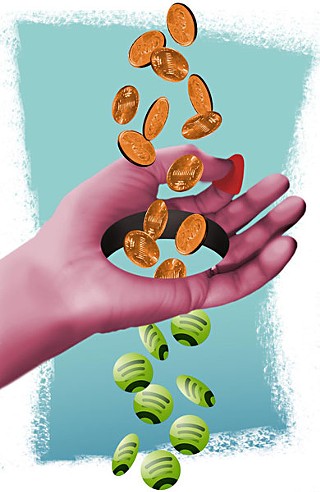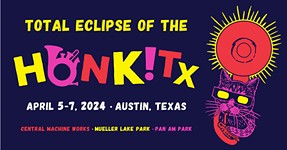Pennies From Heaven
The new streaming economy is here, with or without royalties
By Doug Freeman, Fri., May 18, 2012
Standing on the corner of Fourth and Trinity amid the jostling throngs of South by Southwest, Quiet Company doesn't draw much attention against the blasts of noise and marketing that swirl around them. The local quintet is unassuming save for a cardboard placard that announces "Free Hugs From Quiet Company."
Most of the crowd rushes by, tactfully immune to the maze of street teams, fliers, and reverse panhandling flooding Austin for the annual music festival. The young band draws a few ebullient individuals into its arms, inviting them to free shows that week and encouraging them to check out the group's music online.
Eminently notable about the scene this particular Thursday morning is that the band hustling to create fans one hug at a time is newly crowned the most popular in Austin. The night before, Quiet Company took home 10 Austin Music Awards, including Band of the Year and Album of the Year, for third disc We Are All Where We Belong.
"The actual song is becoming worthless," offers Quiet Company frontman and songwriter Taylor Muse. "As an artist, I just can't see caring about how much I make per song, so it's kind of weird to think of music as really even a stream of revenue for the music business anymore.
"At the same time, it doesn't cheapen it or make it less important because we all know at the end of the day that music is the engine that's driving the ship."
That fatalism regarding the lack of revenue from recordings has increasingly taken hold among artists. With the crash of physical album sales a decade ago, digital downloads and MP3s emerged as the new prospect for keeping the recording revenue ship afloat. Yet as the initial wave of download sales began to slow, with payouts still far below previous industry watermarks, streaming services like Spotify, Rhapsody, and Pandora have begun serving as lighthouses by which the music industry might navigate. For artists, the new streaming economy has yet to provide more than a trickle.
Across all the streaming services currently paying royalties, Quiet Company has garnered over 60,000 song plays since October. For those 60,000 streams, the band has earned $342.
"Are you going to get rich off that?" asks Quiet Company manager Paul Osbon. "No. Can you tour off of that? No. So it's not worth counting on. You can't really budget it. It's a nice bonus. It's the difference between having $5 and no dollars, but are we going to pay our rent with that?
"No."
Celestial Streams
By any standard, streaming services must be understood as still in their formative stages. They account for only a small fraction of music consumption, but they're also the fastest growing format and what most of the industry considers the inevitable future.
The 2012 Annual Music Study from market researchers NPD Group, released in March, found that online radio streaming via noninteractive services like Pandora increased to 43% of U.S. Web users. This remains a small portion of the discovery and consumption spectrum, with AM/FM radio remaining the overwhelmingly dominant medium cited by listeners. Tellingly, free models still far outweigh subscription services for Web users, with only 3% converting to paid, on-demand entities.
Though the shift is small, it's important. With the U.S. launch of Spotify last July (see "Nights in White Satin," Aug. 5, 2011) and the service's integration with Facebook, conversation about streaming evolved from speculation on so-called "cloud" services to deciphering their effect on the industry. At SXSW this year, numerous panels were devoted to streaming royalty formulas and their impact on artists (see "Pennies From the Celestial Jukebox," March 16).
"With all these new technologies, people's memories are short from when they had the same experience with CDs and cassettes," cautions Gary Churgin, president and CEO of the Harry Fox Agency, a licensing, royalty collection, and distribution firm. "Revenue's just starting to flow in from these new consumer experiences, and I think what you're going to see over time is that the economic consequences will become more and more positive.
"Can I predict when? No. Is it going to grow? Yes. How long is it going to take? I don't know."
Much of the confusion surrounding streaming royalties stems from the complexity of adapting previous copyright and payment models to new formats. Increasingly Byzantine formulas are being deployed to anticipate new services. Further, royalties and rights differ between noninteractive Web radio services (Pandora) and on-demand interactive services (Spotify).
"In general, people don't find the licensing process to be a very pleasant experience," admits Churgin. "When Spotify launched this past summer, it was 10 million licenses they needed. The process was not designed with those kinds of volumes in mind. So it's not that people don't want to do it, it's that everybody's world has been turned upside down.
"The entire system of licensing, which includes human procedures and processing as well as technology, wasn't made for this. It wasn't made for speed, for volume, and low value."
Don't Put Another Dime in the Jukebox
The traditional "mechanical" royalty for the physical reproduction of a song was established by the government, a rate currently set at $0.091. Every time the song is reproduced on a CD or downloaded, the songwriter receives just under a dime. Streaming royalties work on a different business model defined by three key differences.
First, there's an additional royalty alongside the mechanical royalty: the right to public performance. Streaming services require both the mechanical rights and performance rights to a song. For interactive services (Spotify), performance royalties are commonly collected through performance rights organizations (ASCAP, BMI, SESAC). For noninteractive streaming services (Pandora, webcasts, Internet radio), performance royalties are collected/distributed by nonprofit government agency SoundExchange.
Second: Royalties for streaming play are much less than the traditional download or purchase, the reasoning being that instead of a one-time royalty payment per download, there are now multiple payments for a single song as plays accrue over time.
Finally, royalty rates are contingent upon overall revenue generated by streaming services. The current mechanical rate for these sites is a statutory rate set by the government: 10.5% of the services' gross revenue, minus the performance royalties. This pool is divided among songwriters based on the number of streams for their songs. In other words, royalties fluctuate not only on the number of times a song is streamed, but also on the gross revenue generated by the service itself every month.
Take Quiet Company's AMA song of the year, "You, Me & the Boatman." Since the group retains all rights to the song and is the performer, it's due money for both the performance royalty via ASCAP and a mechanical royalty, collected in this case through TuneCore, a distribution service that placed the song on streaming sites in lieu of the band having a label. Quiet Company also collects money from SoundExchange for noninteractive digital plays.
How much each play of that song is worth to Quiet Company is different from month to month, depending on the services' revenue and rates defined by what kind of streaming service it is. Not all streams are created equal, but QC manager Paul Osbon's aforementioned bottom line may be: "It's not worth counting on. You can't really budget it."









